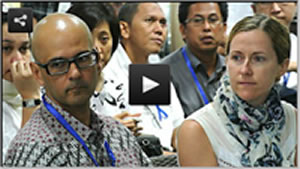
..If asked by family and friends why I teach overseas, I usually respond with something short and simple along the lines of, Oh, I love to travel. Or, I want to see more of the world. I’m convinced it’s best to stick to answers that resonates well in my loved ones’ world — travel, adventure — keep it simple.
..If the conversation dictates, I’ll take my ‘stock’ answer one step further and talk about how life overseas is slower, how people take time for each other. If my listener is still interested I’ll go on to talk about how there are less rules/regulations overseas, which makes life feel far less regimented and a lot less stressful. My longer answer to the question, Why do you live overseas? is usually well accepted because everyone wants a less complicated life with more benefits.
..I avoid going into my more personal, deeper reasons for living overseas. I’m afraid that if I open up to my loved ones, they won’t get it. And when people don’t understand where you’re coming from, they often reject you and see you as somehow different from them. I don’t want to alienate friends and family so I stick to what rings true in their world.
..Because I’m interested to hear from other educators about their more personal reasons for going overseas, I’m going to share with you my well-guarded reason for living overseas, one I don’t ordinarily share with those close to me. As international teachers, I know you’ll understand me, even if you don’t have the same exact motives as I do for living overseas.
..So, here goes…Beyond all the logical benefits of overseas living, I became hooked on living in developing nations because they make me feel alive in a way I never experienced living in the States. Not to sound morbid, but the fact that death feels so much closer and more real here makes me appreciate my life and live it more fully. Back in America there’s a perpetrated, false sense of immortality that caused me to waste life on insignificant things that don’t matter. Overseas I’m free from this illusion.
..On a basic level, walk into any open-air market abroad and you’ll see chickens and small animals pulled out of cages, their necks slit, and then sold ‘fresh’ to shoppers. Pigs and livestock are slaughtered in the open and served in nearby restaurants. Death is not hidden, disguised in glossy packages in brightly lit supermarkets. Americans have divorced themselves from the concept of death in every way possible, further enforcing the false sense of ‘this is forever’ and reducing life to obsessing over trivialities, what other cultures would consider minor annoyances.
..While living in Guatemala in the mid-90’s I had my first life transforming experience based on death. At the corner of my street two policemen had been shot to death by a man who’d stolen a truck. Two bodies lay in the dirt by the side of the road, face up, uncovered, waiting for family to identify them. It startled me that the bodies weren’t covered, yet no one seemed concerned death was staring them in the face. The thing that most deeply impacted me was that at least 50 people, including lots of children, were standing around the crime scene. Most were drinking beer from the nearby market, socializing, catching up with neighbors, and in general enjoying themselves as if they were at a social event. I’d never seen anything like this but it made me understand why the Guatemalans were so full of life and music and took every opportunity to enjoy themselves. Death was very real to them — they weren’t in denial!
..That bloody scene mere meters from my front door, helped me further understand what I’d seen previously in a cemetery during a national holiday. Hundreds of family and friends gathered at the grave sites of their ‘dearly departed’ to barbecue, drink, listen to music, dance and in general, party down with their deceased loved ones. Imagine the results of playing music and dancing on a grave site in Los Angeles!
..Guatemala is only one of many cultures that don’t deny death, thus making life more meaningful, rich and full. Tibetan monks, for example, actually go to the extreme of meditating amidst corpses being prepared for what is known as a Sky Burial (performed by hacking bodies into pieces and laying them out for vultures). They do this to instill in themselves a deep, intrinsic acceptance that life is only temporary. The message is obvious — live fully NOW!
..These days, when I spend any length of time back in America I feel myself slowly slipping into the Western world’s denial of death and soon I’m caught up in the same dulling nonsense that occupies the minds of most Westerners. That’s when I know it’s time to leave again and start living my life to its fullest.
..I would love to hear what motivates other international teachers to leave home and stay overseas. If the spirit moves you and you’d like to share, please do!
Note: This commentary was submitted to ISR for publication by an ISR member who wishes to remain anonymous.





 …
… …
…


 There’s more than a few places in this world where many of us would not be willing to live & teach. I had my reasons for wanting to avoid Pakistan, but the salary/package was so attractive I could hardly say YES fast enough. I loved Pakistan & my bank account literally grew exponentially. The Congo wasn’t on the top of my list, either, but the package was so absolutely alluring I couldn’t say NO, and again, I banked a ton of moohla & got in some outstanding travel adventures.
There’s more than a few places in this world where many of us would not be willing to live & teach. I had my reasons for wanting to avoid Pakistan, but the salary/package was so attractive I could hardly say YES fast enough. I loved Pakistan & my bank account literally grew exponentially. The Congo wasn’t on the top of my list, either, but the package was so absolutely alluring I couldn’t say NO, and again, I banked a ton of moohla & got in some outstanding travel adventures. Dear ISR, I’ve read the many comments teachers sent in reply to your article,
Dear ISR, I’ve read the many comments teachers sent in reply to your article,
 This timely letter from an ISR Member first appeared during winter break, December 2011. We’re reintroducing it today for the benefit of ISR Members who find themselves in this same troubling predicament following the long summer break:
This timely letter from an ISR Member first appeared during winter break, December 2011. We’re reintroducing it today for the benefit of ISR Members who find themselves in this same troubling predicament following the long summer break: